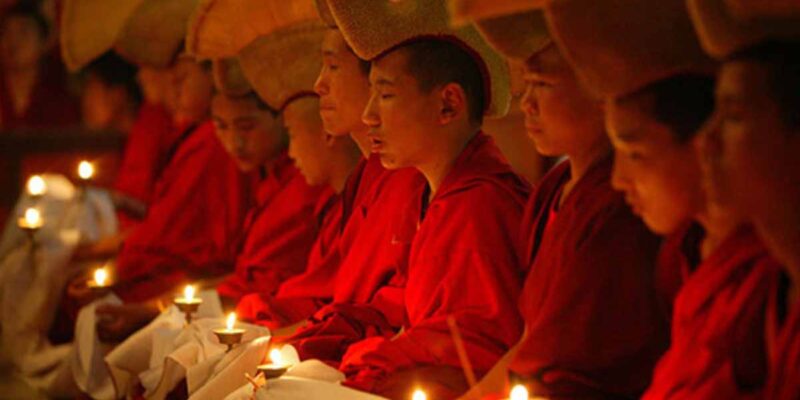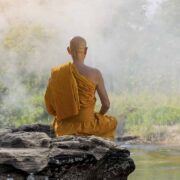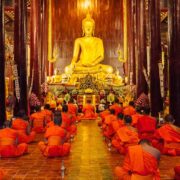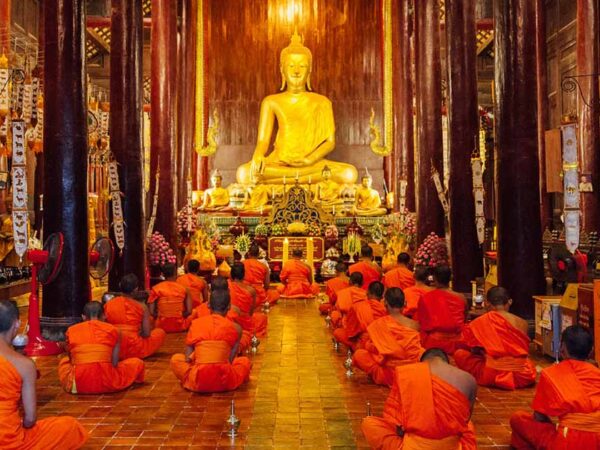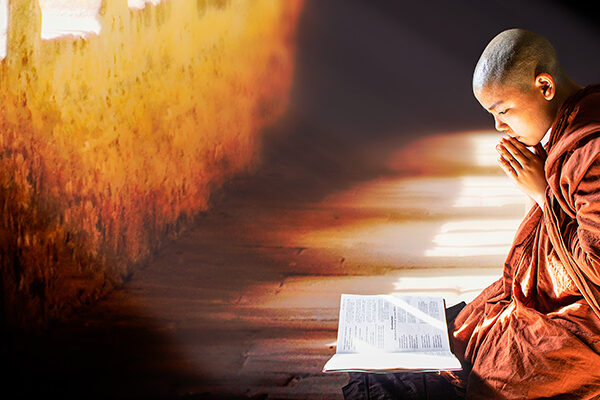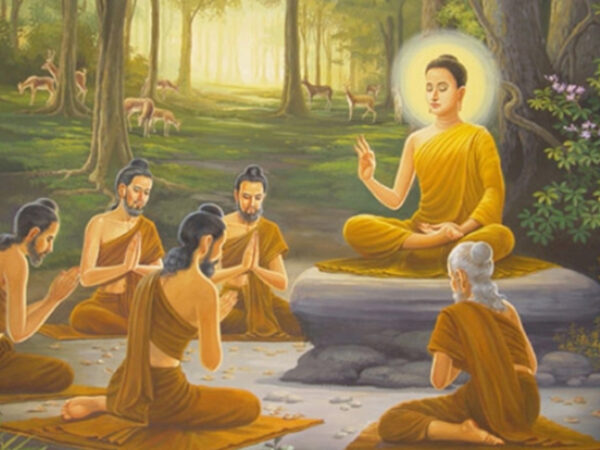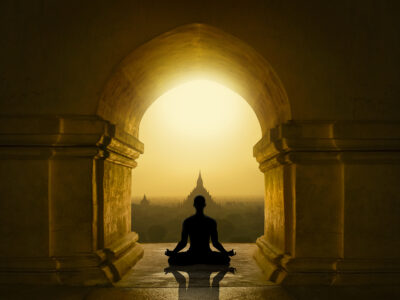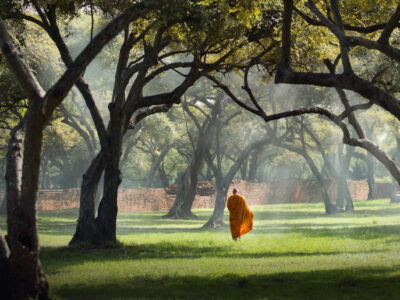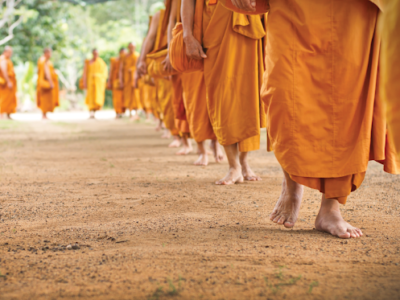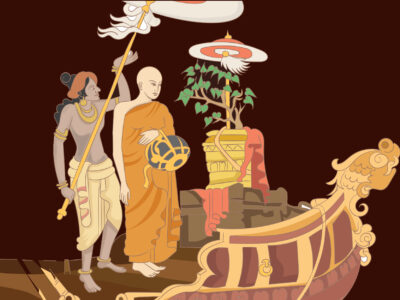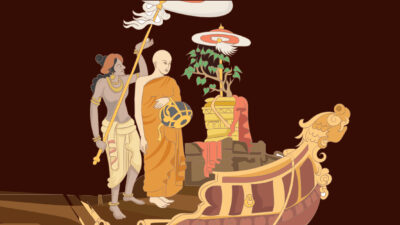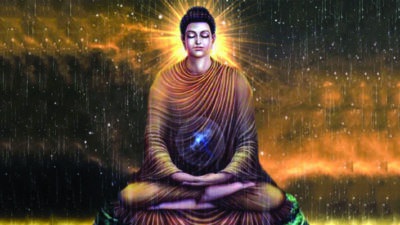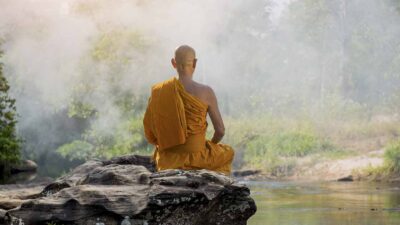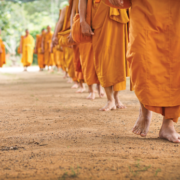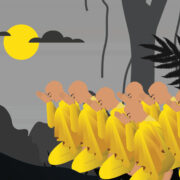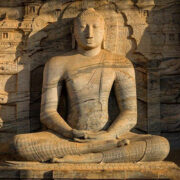When Buddhism entered the Indian scene there was, apart from deep reaching differences, congruence between the trend of thought in Early Buddhism and the conception of the world among the philosophical, ethical and religious systems prevalent in India at that time. The concepts and notions or intuitions common to almost all ancient systems were:-
- SAMSARA, or the round or rebirth, that is to say, the intuition or realization that our present life is but a link in a chain of incalculable rebirths.
- Subject to rebirth are not only human beings and animals but also all heavenly beings, even the mighty Gods.
- The rebirth of men and other beings or death takes place in different spheres’ as of in heavens, among human beings, in the animal kingdom, and also in the so-called states of woe, or hells. The manner of rebirth is conditioned by Karma, that is to say, the inner character of beings, and this character manifests itself by their volitional actions, speech and thought which affect not only their surroundings but also them and thus mature to fruition.
- Rebirth takes place in spheres where all life is subject to the law of impermanence and suffering; the liberation from this recurrent entanglement in the process of impermanence and suffering – samsara – or the round of re-birth – is the aim of all religions and systems of philosophy.
- It is in our power to determine in this life the nature of our future rebirth by controlling our actions, speech, thoughts and volitions.
- Liberation means the cessation of and release from the round of rebirth for the liberated individual. This liberation is realized or actualized through liberating knowledge, and this liberating knowledge means the cessation of all delusion and ignorance that conceals the true nature of things, evokes in beings the craving for things which do not last and satisfy and it is this very craving that leads to ever fresh rebirth. With the extinction of this craving the effect of Karma becomes also extinct.
- After enormous periods of time this world system, our universe, is destroyed, and begins anew, while beings continue living temporarily the so-called higher, or spiritual, spheres of radiant gods, and are progressively reborn in the newly formed or forming Brahma world. But all such beings are subject to rebirth in the material universe as it forms, and as soon as rebirth there is possible for that particular species of beings. The destruction and formation of the universe is not effected by an agency outside the world, but by causes and conditions inherent in the world itself. In like manner, the rebirth of beings is not directed by a supernormal or superhuman agency or factor, but by causes and conditions created by the beings themselves through their actions – Karma. No first beginning of this round of rebirth can be perceived; but it is of such a nature that a cessation may be affected by creating the necessary conditions for the liberation from all suffering of rebirth.
If we compare the Teaching of the Buddha with the notions prevalent in the West, we see that the apparent incompatibility of some of its tenets with the conceptions found in the West is not so great either. The idea of a Law governing not only the world but also the life of individuals and nations was taught already in the Old Testament of the Bible. Impermanence, suffering and absence of an unchanging core either in man or in the universe, has been well formulated by many Greek and Roman philosophers; and Christianity, especially in the first centuries of its existence, is resounding with the teaching of impermanence, suffering, emptiness and vanity of all things and a longing for liberation. The round of rebirth, though a startling revelation to a Western beginner in the study of Buddhism, was taught in Egypt, Greece, and all over the West in pre-Christian times. The Teutons and the Anglo-Saxons of Britain had their firm belief in a Valhalla where the warrior after death spent their days in fighting and all nights in feasting. Though indeed very few students are aware of it, research scholars have discovered that even in the land where Christianity arose, in Palestine, the masses, disregarding the orthodox view of one life and a single creation of the world, believed in rebirth. When, for instance, the disciples of Jesus saw a man born blind, they did not ask their master why ‘God’ had created him blind, as some would ask now; they wanted to know if the man’s blindness was due to his own or to his parents’ sin; did this man sin or did his parents? As it would be a monstrous thought to assume that a man could be born blind for his sins that were to be committed subsequently, the disciples certainly believed in the possibility of sinning before one is born, hence believed in rebirth, accepted the possibility of our having lived before this earthly existence. Besides this, King Herod and his people believed that Jesus was a rebirth of John the Baptist or some of the Prophets of old. This belief in rebirth was so strong among the first Christians that in 553 C.E., when some theologians began to fear that it would render the power of the Church ineffective, they condemned it at a Church Council at Constantinople, and declared the belief in rebirth a heresy. Few are indeed aware of fact that, in spite of all this, even the most orthodox Christians do admit rebirth and the continuation of one’s life after one’s death either in heaven or in hell or an intermediate state where the ‘soul’ undergoes a process of purification before it is fit for entrance into heaven, and the conception is in Buddhism called rebirth.
At present, when modern science has annihilated delusion of permanence in the world and teachers a casual relation between all events, and modern psychology teaches the same casualty in the stream of consciousness, instead of a soul thought of as not subject to the law of casualty, impermanence suffering and impersonal character more and more students study Buddhism and turn to the “more scientific” Buddha – Dhamma. This is the most opportune moment for Buddhists to step in and fill the gaps still existing in the Westerner’s view of life and thus satisfy the yearning of many men who feel that much could be learnt from the Buddhist East. Though the Dhamma, according to the Early Buddhist Scriptures, does not teach about God and soul in the traditional manner, and does not accept a savior, yet Buddhism explains all the problems that are not satisfactorily solved with the help of these subsidiary concepts. Buddhism comes nearest of all the world religions to the ideal of modern man, and it has influenced for the betterment of more lives than any other teaching, and hence the Dhamma deserves to be studied by all. The ‘Supertheism’ of the Dhamma resolves all the dilemmas in which are involved all theistic systems when attempting to explain the incidence of suffering in the world and reconcile it with the conception of a benevolent creator. Liberation from suffering is the central problem of Buddhism, and the Dhamma is the Path that leads to the Liberation from all suffering and to the attainment of lasting bliss, that is to say, to Enlightenment and Nibbana.
By Ven. G. Nyanasatta Thera

